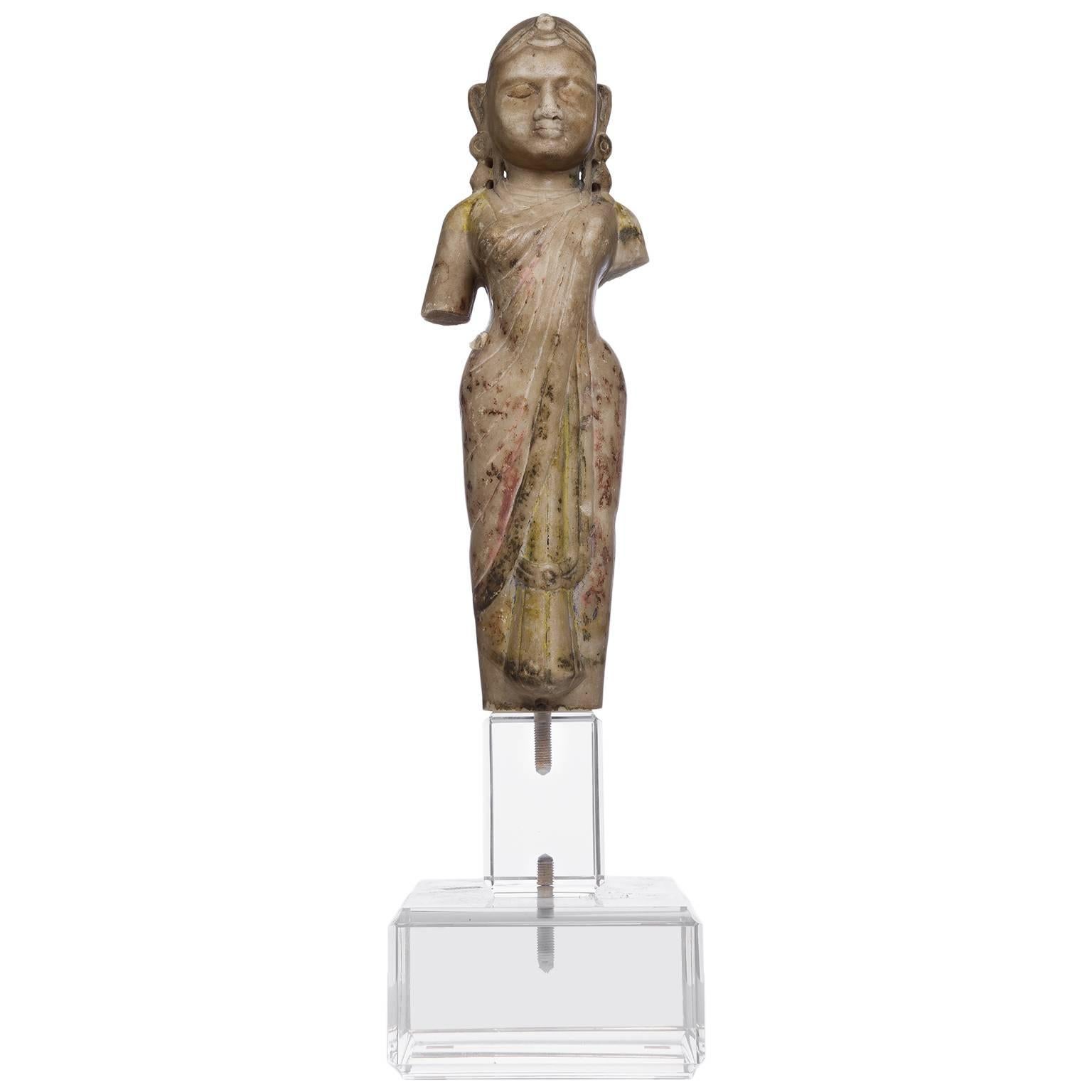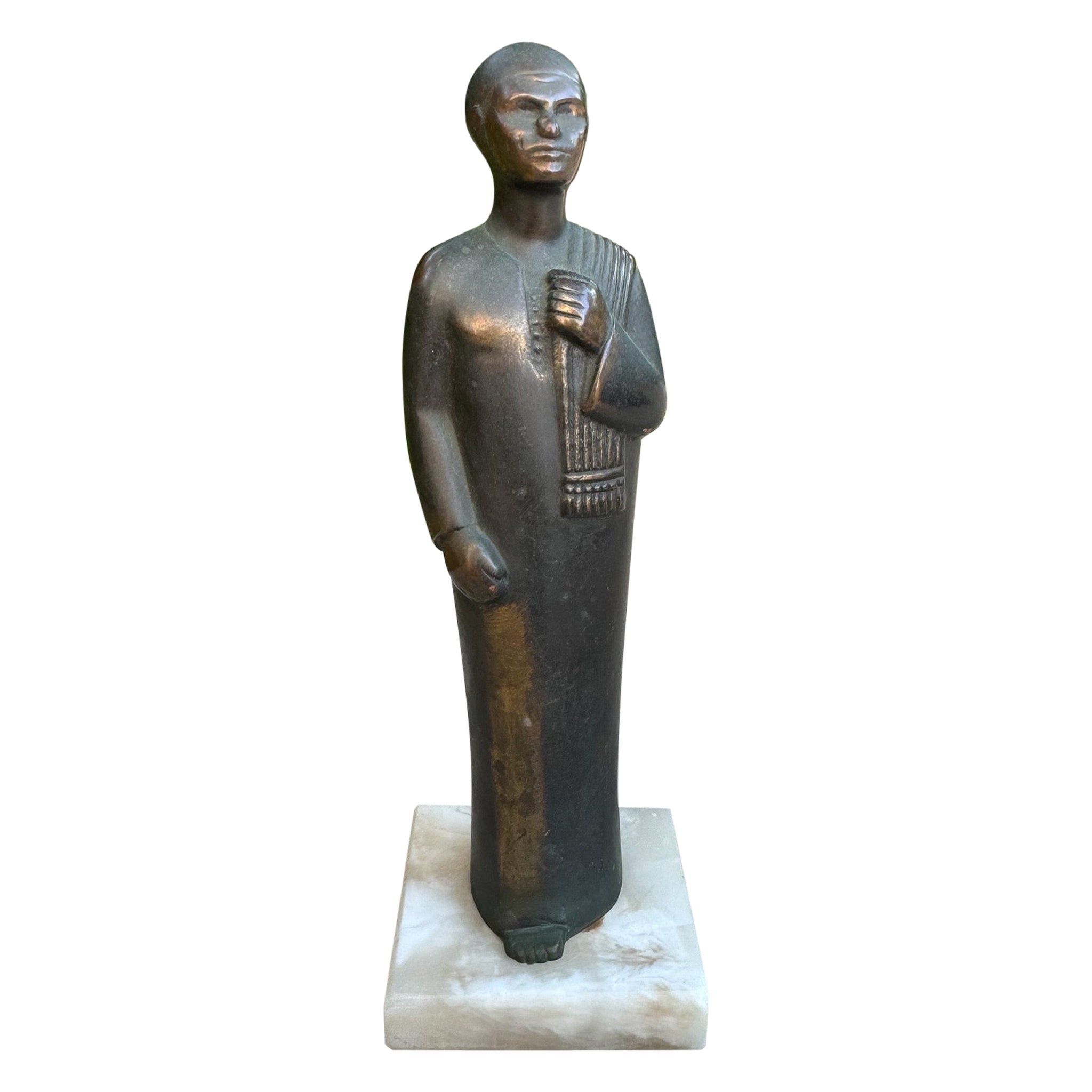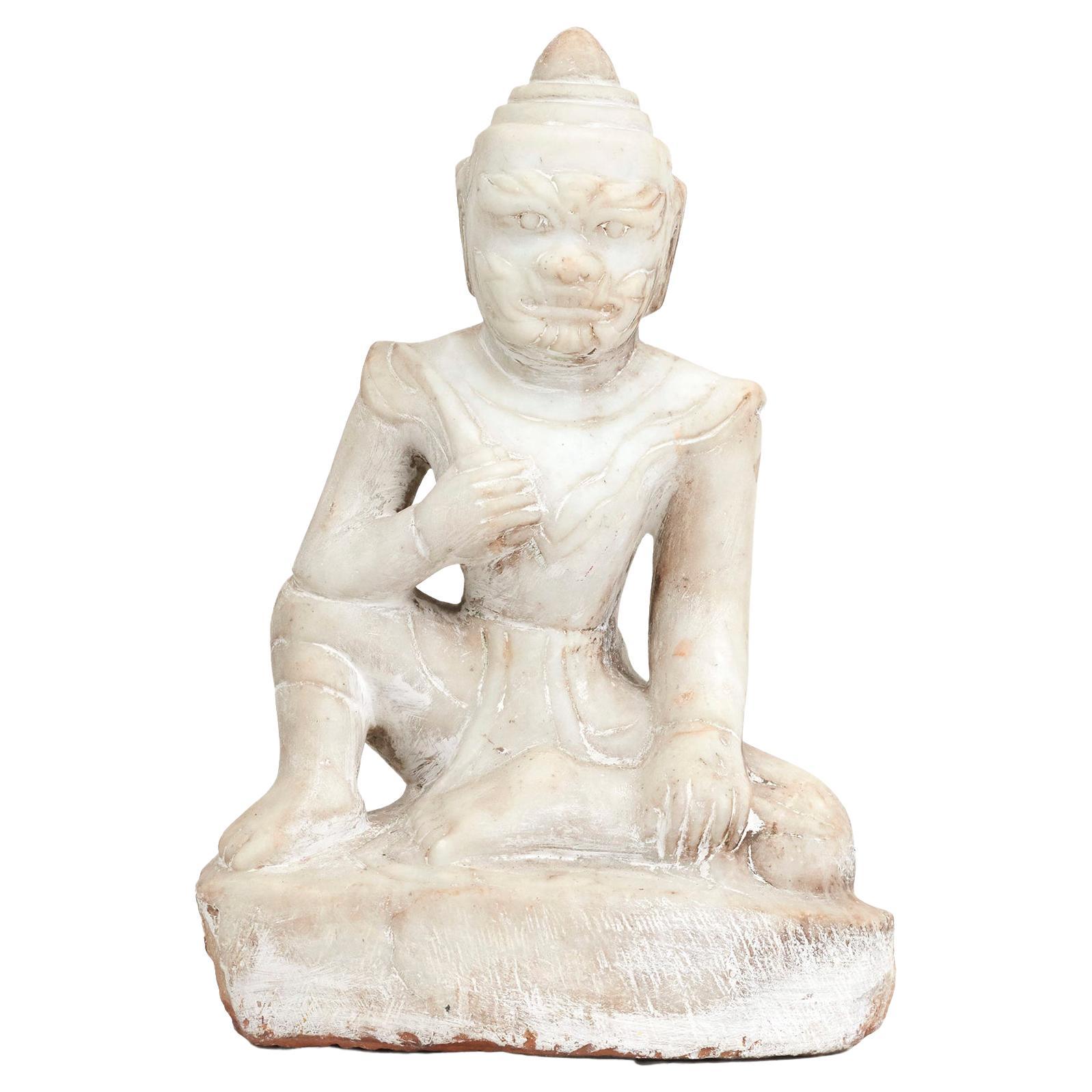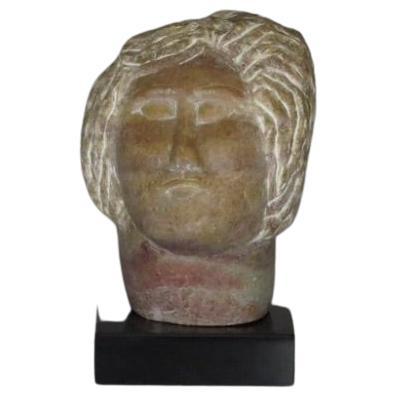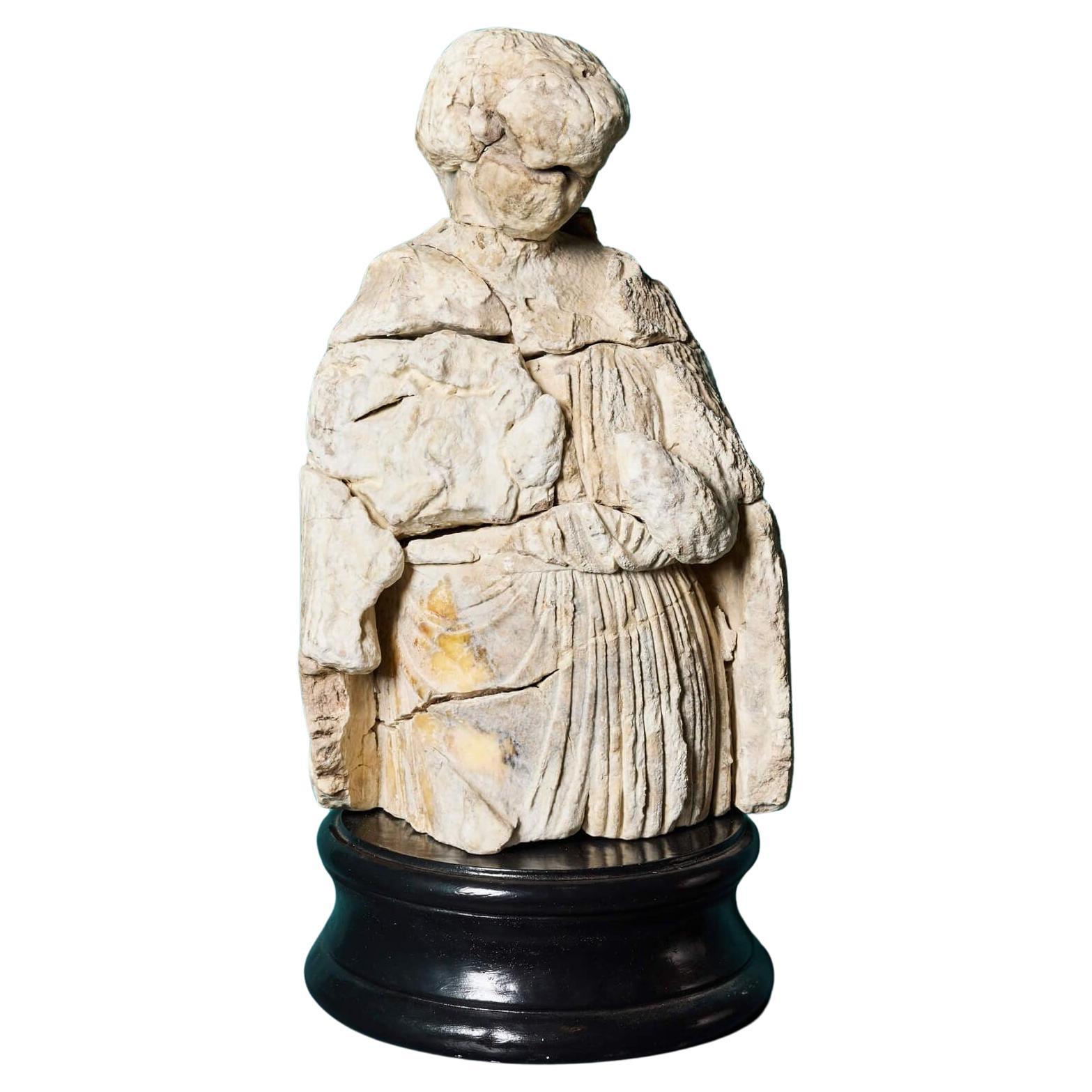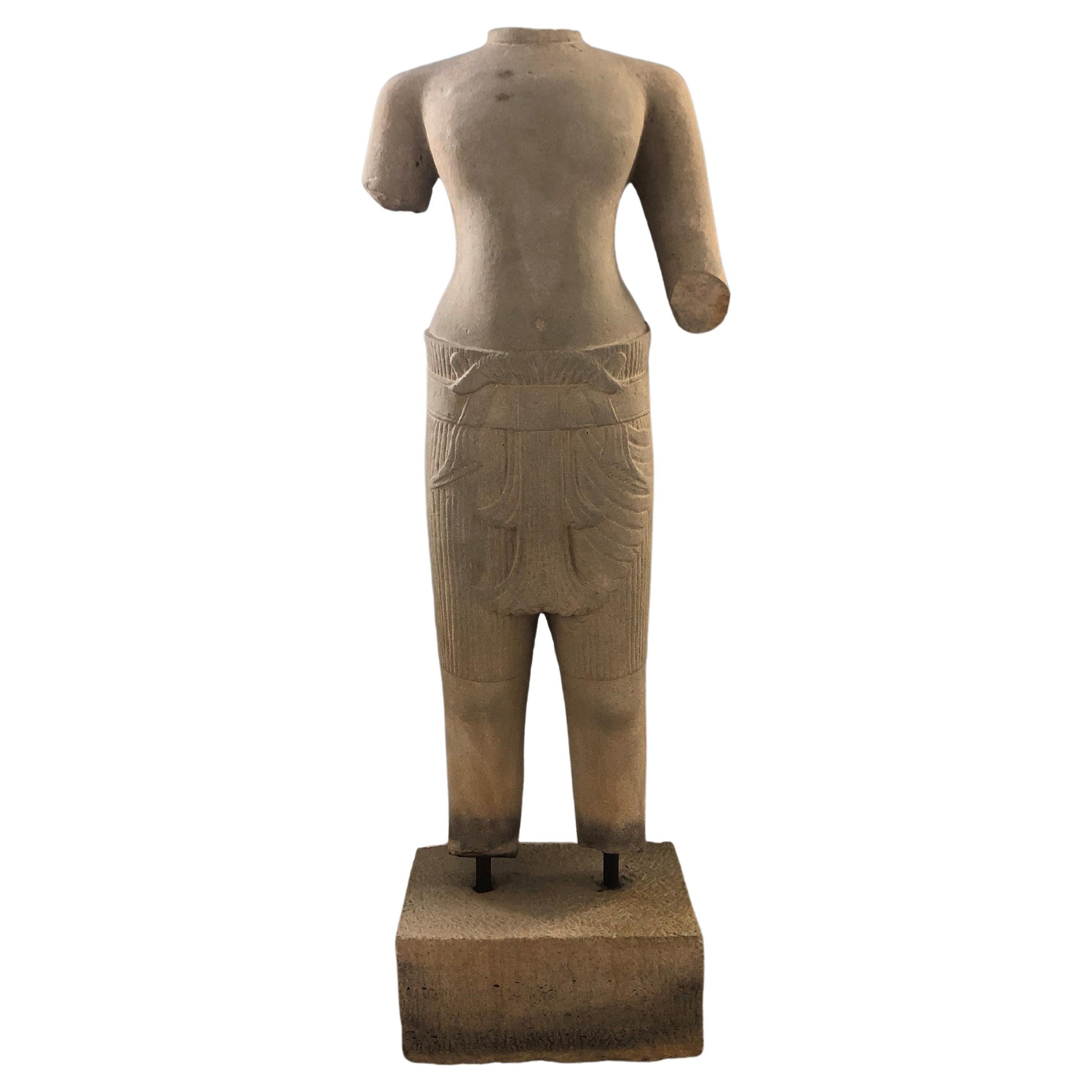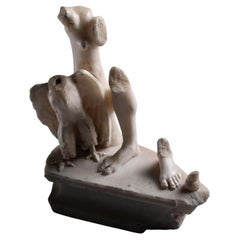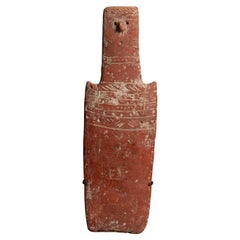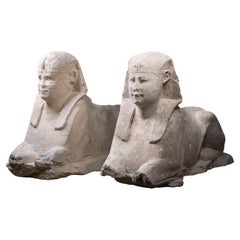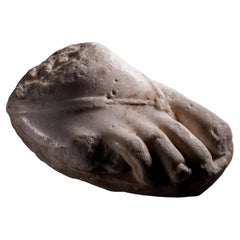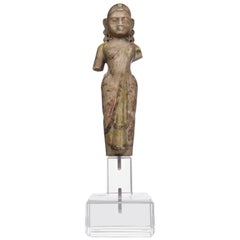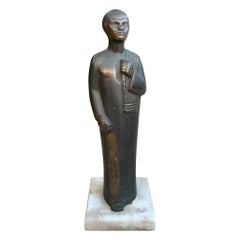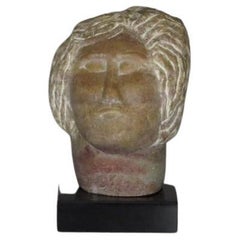Items Similar to Ancient South Arabian Alabaster Statue
Video Loading
Want more images or videos?
Request additional images or videos from the seller
1 of 9
Ancient South Arabian Alabaster Statue
$120,000
£90,619.21
€103,750.65
CA$169,471.37
A$185,022.17
CHF 96,999.55
MX$2,247,165.47
NOK 1,211,366.48
SEK 1,143,852.97
DKK 774,388.08
About the Item
South Arabian Calcite female figure
3rd Century BC to 1st century A.D.
Calcite Alabaster
height: 30.5 cm
A magnificent alabaster female figure, a fine example of the well-studied grace that characterises South Arabian art. The figure is standing with extended arms and clenched fists, the sensitively carved face exudes power and mystery, with large, almond-shaped eyes, sweeping eyebrows, straight nose, and gently smiling lips.
The South Arabian kingdom of Qataban rose to prominence in the fourth century BC. Its capital, Timna - according to Pliny the Elder, adorned with 65 temples - was an important stop along the incense trade route, thanks to which it became an extremely prosperous and sophisticated economic and cultural centre. The style of the present figure suggests it comes from Haid bin Aqil, Timna’s necropolis, where some of the greatest treasures of South Arabian art have been discovered. Qatabanian sculptors were greatly skilled, and well known for the subtlety and elegance of their designs. Their strikingly modern figures fascinated and inspired some of the most important artists of the early twentieth century, including Pablo Picasso and Amedeo Modigliani.
Complete figures of this type with an original surface and documented provenance very seldom pass into private hands; this piece represents not only a superb piece of ancient sculpture, but a real rarity on the art market today.
Provenance:
Probably from Haid bin Aqil, the necropolis of ancient Timna
French private collection, Aden and Paris, acquired in Yemen in the 1960s and legally exported to France. With French cultural property passport.
Published:
Yémen, Au pays de la reine de Saba, p. 100
Sabina Antonini, La statuaria sudarabica in pietra, Paris and Rome, 2001, p. 112.
- Dimensions:Height: 12.01 in (30.5 cm)Diameter: 4.49 in (11.4 cm)
- Materials and Techniques:
- Place of Origin:Yemen
- Period:
- Date of Manufacture:3rd Century BC-1st Century A.D.
- Condition:Wear consistent with age and use.
- Seller Location:London, GB
- Reference Number:Seller: 428291stDibs: LU1052232167902
About the Seller
5.0
Recognized Seller
These prestigious sellers are industry leaders and represent the highest echelon for item quality and design.
Established in 2007
1stDibs seller since 2014
103 sales on 1stDibs
Typical response time: 6 hours
Associations
LAPADA - The Association of Arts & Antiques DealersInternational Confederation of Art and Antique Dealers' AssociationsThe British Antique Dealers' Association
- ShippingRetrieving quote...Shipping from: London, United Kingdom
- Return Policy
Authenticity Guarantee
In the unlikely event there’s an issue with an item’s authenticity, contact us within 1 year for a full refund. DetailsMoney-Back Guarantee
If your item is not as described, is damaged in transit, or does not arrive, contact us within 7 days for a full refund. Details24-Hour Cancellation
You have a 24-hour grace period in which to reconsider your purchase, with no questions asked.Vetted Professional Sellers
Our world-class sellers must adhere to strict standards for service and quality, maintaining the integrity of our listings.Price-Match Guarantee
If you find that a seller listed the same item for a lower price elsewhere, we’ll match it.Trusted Global Delivery
Our best-in-class carrier network provides specialized shipping options worldwide, including custom delivery.More From This Seller
View AllRoman Marble Statuette of Jupiter
Located in London, GB
Roman Marble Fragment of jupiter
Circa 2nd-3rd Century A.D.
Measure: Height: 19.7 cm
This beautiful Roman fragmentary statuette depicts Jupiter, the king of the gods, here recognisable from his two chief attributes, the eagle with outstretched wings - according the Pseudo-Hyginus, singled out by Jupiter because ''it alone, men say, strives to fly straight into the rays of the rising sun'' - and the base of the scepter, which remains at the side of the left foot, an aspect likely borrowed from the statue of Zeus at Olympia, once one of the Seven Wonders of the World. Though much of the original piece has been lost, the subtle anatomical detail in the feet mark this out as a piece of exceptional quality, and the work of an artist of particular talent and patience - as Johann Winckelmann once said of the famous Belvedere Torso, ''if you contemplate this with a quiet eye [...] the god will at once become visible in this stone.''
This fragment once caught the eye of Henry Howard, 4th Earl of Carlisle (1694-1758), a Knight of the Garter and among the most prolific collectors of his day. The piece, acquired during his travels to Rome, was proudly displayed on an alcove of the Western Staircase of Castle Howard...
Category
Antique 15th Century and Earlier Italian Classical Roman Figurative Scul...
Materials
Marble
Cypriot Bronze Age Terracotta Plank Idol
Located in London, GB
This extremely well-preserved, stylised Cypriot plank idol is an iconic form of human representation from Bronze Age Cyprus. Made from burnished earthenware with lime-filled incision...
Category
Antique 15th Century and Earlier Cypriot Prehistoric Abstract Sculptures
Materials
Terracotta
Ancient Egyptian Monumental Temple Sphinxes
Located in London, GB
A pair of monumental limestone sphinxes of Pharaoh Nectanebo I, from the processional avenue of the Serapeum of Memphis, 30th Dynasty, circa 379 - 360 BC.
The sphinxes of the Serapeum have captivated travellers since Roman times. However, despite their significance, they are conspicuously absent from the collections of most major museums. Indeed, their existence in private hands is so improbable, and their imitations so numerous, that the present sphinxes were assumed to be modern copies throughout their recent ownership history. Finally recognised and conserved after an extraordinary chance discovery at a garden furniture sale...
Category
Antique 15th Century and Earlier Egyptian Egyptian Figurative Sculptures
Materials
Limestone
Roman Marble Foot
Located in London, GB
Roman marble Fragment of a Right Foot with Sandal
Circa 1st - 2nd Century A.D.
An evocative Roman marble fragment, preserving the front portion of an over-lifesized sandalled foot. The toes, nails, and bridge of the foot have been sensitively carved. The outer sole of the sandal remains, with delicate, pointed straps joining between the first two toes in a diamond shape.
This fragment once belonged to Danish sculptor Jens Adolf Jerichau...
Category
Antique 15th Century and Earlier Italian Classical Roman Figurative Scul...
Materials
Marble
Roman Marble Head Fragment
Located in London, GB
This fine Roman marble head fragment, with broad nose, soft lips, and bearded chin, captures the likeness of one of the most important playwrights of...
Category
Antique 15th Century and Earlier Italian Classical Roman Busts
Materials
Marble
Ancient Egyptian Limestone Relief with Hieroglyphs
Located in London, GB
Egyptian New Kingdom Relief Fragment
Carved limestone
New Kingdom, circa 1550-1069 BC
12 x 16.5 cm
This beautiful fragment preserves three columns of neat hieroglyphs deeply carved ...
Category
Antique 15th Century and Earlier Egyptian Mounted Objects
Materials
Limestone
You May Also Like
Sculpture Antique Marble Indian Statue
Located in Alessandria, Piemonte
Rare antique important marble statue of Gopi, mounted on a plexiglass base, in modern taste.
Statue high 47 cm; with base cm. 71 - plexiglas base is cm. 20 x 20.
Unique item!
Sec...
Category
Antique Late 18th Century Indian Agra Figurative Sculptures
Materials
Marble
$5,900 Sale Price
30% Off
Solid Brass & Marble Figurative Sculpture, Early 20th Century
Located in San Juan Capistrano, CA
Solid Brass & Marble Figurative Sculpture, Early 20th Century. Really nice natural patina.
Category
Early 20th Century Unknown Egyptian Revival Figurative Sculptures
Materials
Marble, Brass
$280 Sale Price
20% Off
19th Century Carved Alabaster Temple Guardian
Located in Kastrup, DK
A Burmese sculpture of a Buddhist temple / paragoda guard carved from Alabaster.
The guards guarded the temple/pagoda.
From a Danish collectors est...
Category
Antique Early 19th Century Burmese Other Figurative Sculptures
Materials
Alabaster
Stone Mythological Figural Sculpture
Located in Washington, DC
Vintage Peach Stone Abstract Sculpture depicting a Greek Mythological Figure. Greece, circa 1960. Signed by an unknown artist on a contemporary black stone...
Category
Vintage 1960s Greek Classical Greek Figurative Sculptures
Materials
Stone
Medieval English Alabaster Statue
Located in Wormelow, Herefordshire
A medieval English alabaster statue, possibly dating as far back as the late 14th / early 15th century, mounted on one of our exclusive large display plinths. Well weathered over the centuries, this 600-year-old statue depicts a medieval cloaked figure, possibly a monk, offering a glimpse into English architecture and sculpture of the Middle Ages.
This sculpture is possibly made from Nottingham alabaster. During the 14th and 15th centuries, Nottingham was the centre of alabaster carving and painting. Alabaster works were mostly made as small alabaster models with religious themes. During the 16th century Reformation, many alabaster carvings were destroyed under King Henry VIII's rule, making any surviving examples even more significant.
Provenance
From the collection of Peter Hone (b. 1941). A master plaster caster, he is an expert and experienced collector, building up an extraordinary, museum-worthy collection of items in his one-bedroom flat in London W11...
Category
Antique 15th Century and Earlier English Medieval Figurative Sculptures
Materials
Alabaster
Grand Scale 15th Century Solid Hand Carved Stone Male Statue
Located in Larkspur, CA
Grand scale 15th century solid hand-carved stone male statue. Source of origin Bhutan.
Category
Antique 15th Century and Earlier Figurative Sculptures
Materials
Stone
More Ways To Browse
Brown Alabaster
Arabian Antique
Antique Passport
Antique Passports
Antique Yemen
Aden Yemen
French Bisque Porcelain
Goddess Minerva
Greek Muses
Mathurin Moreau Bronzes
Antique Black Figurines
Antique Silver Statue
Art Deco Alabaster Sculptures
Capodimonte Ceramic
Carrara Marble Figure
Carrier Belleuse Bronze
Carved Figure Germany
Chinese Dancer
